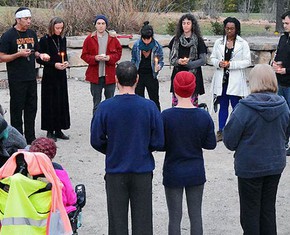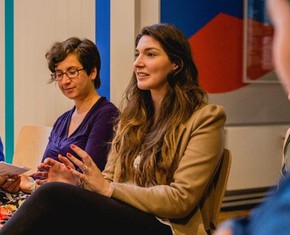What is the role of journalists in promoting understanding and dialogue, especially in a media environment that is often driven by sensationalism?
This was among the questions explored by two experienced journalists in the United Kingdom — a former BBC reporter and a writer for The Guardian newspaper — along with members of the Baha’i Office of Public Affairs of that country in a recent podcast produced by that Office titled In Good Faith: Truth and Standards in Media.
“Writers have to be free from prejudice, fair-minded, and be able to look at issues with a sense of justice,” said Carmel Kalani, of the Office of Public Affairs.
Ms. Kalani drew on an analogy from the Baha’i teachings to describe the power of the media in raising public consciousness, stating: “Newspapers, social media, and other forms of media are like ‘the mirror of the world.’ They are ‘endowed with hearing, sight, and speech.’”
One of the implications of this, she said, is that articles and other forms of expression by journalists have the potential to inspire in all of us a sense of oneness with our fellow human beings.
“When journalists tell a story, they shape the world we live in, they shape what we see as possible,” said Ms. Kalani, explaining that the media can unlock the “immense capability of people to bring about unity and peace.”
Despite this tremendous potential, certain practices place pressure on journalists to produce reports that are sensationalist, such as surprising people in distress for an interview.
“There’s something called the ‘door-knock’ in journalism, whereby you have to go and knock on somebody’s door, who’s in the middle of a story, usually through no fault of their own … and ask them for a comment on their doorstep,” said John McManus, former BBC reporter and head of communications for the Jesuits in Briton.
“It [is] purely to fill time and a news story,” continued Mr. McManus, as he explained that this approach typically does not yield any new facts. Instead, it caters to the audience’s appetite for the dramatic and can distract attention from the real issues.
Mr. McManus added that many journalists are uncomfortable with practices in their field that lead to sensationalist news coverage and stressed the importance of empathy and preservation of human dignity when reporting. “At the heart of all these stories are human beings with feelings. … They’ve all got family. So I always try to remember that, [which] moderates my thinking and actions.”
Remona Aly, a reporter for The Guardian, stated: “You have this sense of responsibility to whoever you’re interviewing. … I really try hard to maintain that protection. I say [to the interviewee] ‘you can look over the article afterwards so that you’re comfortable with it.’”
Discussions also looked at how biases and false dichotomies can reduce multi-faceted issues to simplistic representations of reality that reinforce social, political, economic, and religious divides, leading to sensationalist news coverage.
Mr. McManus, speaking about the responsibility of journalists to maintain objectivity, stated: “Things are not black and white. You can hold two different points of view in your mind which are both correct, because we know that human life is infinitely varied and complex.”
Reflecting on this discussion, Nancy Warren, of the Baha’i Office of Public Affairs, explains that this podcast series is part of the ongoing efforts of the Office to contribute to the discourse on the constructive role of media in society.
“People begin their journalistic career with very high ideals, but they eventually find it difficult to write in a way that is in line with their principles,” she says.
“The forums offered by the Office — be they podcasts, online discussions, or in-person gatherings—provide a space for journalists to explore prevalent issues in their field in light of spiritual principles that resonate with their moral convictions.”
















Comments
Sign in or create an account
Continue with Googleor